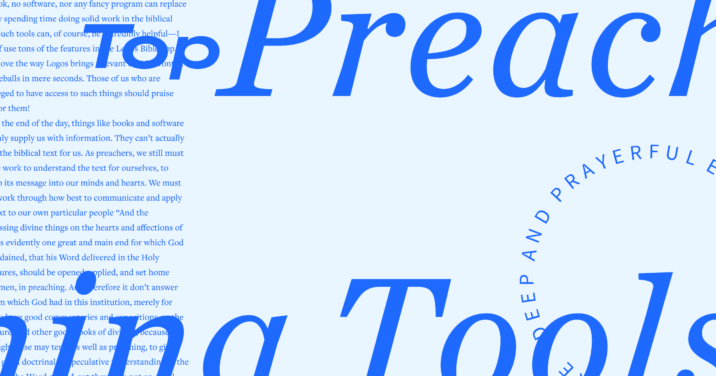In his classic work, The Christian Ministry, Charles Bridges opens his section on sermon composition with these words:
How much responsibility attaches itself to the subject matter and the mode of our pulpit addresses! It cannot be of light moment, whether our people are “fed with knowledge and understanding,” or with ill-prepared and unsuitable provision. The pulpit is the ordinary distribution of the bread of life for their daily nourishment, and much wisdom indeed is here required.1
Indeed, it is! Writing and delivering well-communicated, biblically faithful sermons demands our study and energy. But having the right tools can help us in that effort.
In this article, we’ll survey some of the best tools and resources available to preachers in the sermon-preparation process.
You and your Bible
Before we get started, let’s state clearly that no book, no software, nor any fancy program can replace simply spending time doing solid work in the biblical text. Such tools can, of course, be incredibly helpful—I myself use tons of the features in the Logos Bible app, and I love the way Logos brings relevant data in front of my eyeballs in mere seconds. Those of us who are privileged to have access to such things should praise God for them!
But at the end of the day, things like books and software can only supply us with information. They can’t actually study the biblical text for us. As preachers, we still must do the work to understand the text for ourselves, to absorb its message into our minds and hearts. We must then work through how best to communicate and apply the text to our own particular people2 (nor do we want to forestall that work by too quickly running to resources 3). In fact, in my experience, my most valuable work in sermon prep doesn’t come when reading a commentary or using Bible software (as helpful as those things are), but rather it comes from reading and re-reading the text, making observations, meditating on that text4 and wrestling with its meaning.
This also means that, if you are someone who doesn’t have access to things like Bible software or a large library of books, you are not so disadvantaged that you cannot serve your congregation well in your preaching. As long as you have a good translation of the Bible, a sharp mind, a heart to know and submit to God’s word,5 and diligent prayerfulness6, you have all you actually need. (And regardless, even if we are disadvantaged, God can overcome our weaknesses—see 2 Cor 12:9.) So don’t be discouraged by what’s available that you may not have access to.
Study & reference tools for preachers
Nonetheless, a library is to a preacher as the toolbox is to a carpenter. Pastors and elders are teachers of God’s word (Eph 4:11; 1 Tim 3:2; 5:17). And solid books help us better understand God’s word as we seek to communicate its message to our congregations.
Some of the most helpful books or reference works for sermon prep are as follows in the nine categories below:
1. Commentaries
A biblical commentary is a book that provides an interpretive explanation of a biblical book or books. Commentaries provide explanations of a biblical book’s larger structure or argument, as well as detailed explanations of specific biblical passages. Commentaries also typically engage with introductory matters such as the authorship of a given book, its audience, its date of writing, its purpose, its composition, etc.
Commentaries come in different forms and have different purposes, however. They are commonly either expositional (focusing on helping preachers make sermons, usually by providing model sermons), devotional (focusing on helping people derive spiritual instruction, comfort, and challenge from the Bible), or technical (focusing on interpretation of the Hebrew and Greek). One does well to keep these different commentary types in mind when selecting them.
Some of my favorite commentaries or commentary series for sermon prep include:
- Commentary on the New Testament Use of the Old Testament
- Exegetical Summaries Series
- Pillar New Testament Commentary
- ESV Expository Commentary
- Zondervan Exegetical Commentary
- New International Commentary
- New International Greek Testament Commentary
- Baker Exegetical Commentary on the New Testament
- New American Commentary (which is being replaced by the Christian Standard Commentary)
- God’s Word for You
For specific help finding a good commentary, consider the following:
- BestCommentaries.com is a site that provides reviews and rankings for a variety of biblical-theological resources, including commentaries. Included is basic information about each commentary, e.g., author, date, series, and type (e.g., technical, pastoral, devotional, Jewish).
- Keith Mathison and Tim Challies offer a lists of their top commentaries, along with brief explanations.
- Baker Academic offers Old Testament and New Testament commentary surveys, identifying top commentaries for each book of the Bible.
- Pastor friends who have preached a book of the Bible will commonly be happy to tell you what their favorite commentaries were.
For those on a budget, two solid one-volume commentaries on the whole Bible are the New Bible Commentary and The Expositor’s Bible Commentary: Abridged Edition. In addition, The Gospel Coalition is working on an online commentary, executed by top-tier scholars, for each book of the Bible—entirely for free.
2. Interlinears
An interlinear presents the biblical text in its original language along with translation immediately below each word. (Some interlinears are formatted reversely, i.e., they present a translation on top with the corresponding original language immediately underneath.)
An interlinear can be a helpful tool for those who want to incorporate the original language in their study, but maybe don’t know Greek or Hebrew, or maybe know Greek and Hebrew but want the aid of an interlinear to make working in the original languages a bit easier.
3. Translations
It can be helpful to check different English translations as you study a passage. This not only helps one be aware of the translations that may be in your congregation’s laps as you preach, but it can also help provide you different perspectives on your passage and potentially identify different interpretive options, as present in the translations.
4. Lexicons
A biblical lexicon is a reference tool that provides meanings, semantic ranges, and significant uses of biblical words in their original language. This data is organized according to an inventory of lexemes (i.e., a meaningful linguistic unit). Lexicons are particularly helpful in word studies.
The top two lexicons are likely HALOT (for the Hebrew Old Testament) and BDAG (for the Greek New Testament), which are available as a bundle on Logos.
5. Dictionaries
Bible and theological dictionaries are reference tools that provide an encyclopedia of articles on a range of topics. For example, the IVP Bible Dictionaries is an excellent series of dictionaries covering the full range of the biblical corpuses.
6. Sermons
I will sometimes listen to others’ sermons on the passage I’m preparing to preach—not to copy them, of course; but maybe to consider how they handle certain parts of the passage or to help me meditate on the passage’s application. Two of my favorite places to find sermons are The Gospel Coalition and Monergism.
7. Additional resources
For further help building your pastoral library, see my Recommended Resources page on Logos, as well as my series further elaborating on Key Bible & Theological Reference tools.7
8. Apps
Bible apps are mobile or desktop (usually both nowadays) programs that contain various features designed to help one study Scripture. Typically, Bible apps come with books (including Bibles and commentaries) and tools to search and study those books. Bible students today can perform powerful searches and employ quick research functions to utilize their libraries.
There are a number of good apps out there, but I will focus here on the one I use, Logos Bible Study. The Logos platform is a comprehensive digital library and research tool; it has a vast library, excellent original language capabilities, and overall far more comprehensive functionality than other apps. In addition to its in-depth Bible study capabilities, Logos also contains an array of tools for researching and studying other matters as well, such as theology, church history, pastoral counseling, and more.
Two of the tools in Logos that I find most helpful for regular sermon prep are the Passage Guide and the Factbook. The Passage Guide automatically serves up resources (e.g., commentaries) and study tools based on the particular passage of Scripture I select. The Factbook, on the other hand, searches my entire library, showing me lots of the resources I have on a given theme, person, place, event, or more. This can be helpful when I have questions or need further information on a given topic related to my sermon.
The expense of Logos depends on the number of books you decide to buy with it. That said, Logos often runs sales where you can find books at incredible rates. Additionally, when you purchase books in Logos’s bundles, users can receive steep discounts per individual book.
Additional programs
For those a budget, STEP Bible is a free web-based Bible study app that contains loads of free Bibles, has some basic tools for working in original languages, and comes with a handful of free older commentaries.
Biblearc is a free web-app designed for arching and diagraming scripture passages.
Semanticdictionary.org has some important and helpful original language study tools, including the Louw-Nida New Testament lexicon.
NETBible.org is also a place I send Bible students.
And, of course, there’s now ChatGPT. Now, obviously don’t use ChatGPT to write your sermons (that would be unethical!), but you might use ChatGPT to help you generate ideas, like illustrations.
Workshops & training
If you don’t preach expositionally, first of all, you should!8 And if you’re looking for training to become more faithful in your exposition, I can’t recommended ministries like Charles Simeon Trust and Word Partners highly enough.
Both organizations operate from similar training material and offer regular workshops that seek to equip preachers in the skills of exposition. You will be provided instruction on key principles as well as given opportunity to put them into practice and receive valuable feedback.
These organizations utilize a helpful worksheet that can guide your study of the text. I’ve developed similar worksheets which include similar guiding questions along with a sermon check-list, application prods, and more.
Note-taking & organization
If you’re in the business of taking notes as you study, you’ll need a place to jot them down—and ideally save them and integrate them into a wider note-storing system.
There are many note-taking apps out there that will be more than capable of doing this sort of thing: e.g., Microsoft OneNote, Apple Notes, Google Keep, Joplin, Obsidian, Evernote, or even Logos native note-taking feature.
Evernote, for instance, which is what I use, allows you to create “notes” which you can write in, but to which you can also add image files, audio, links, webpages, PDFs, Microsoft Word documents, and more. In other words, it can be a dumping ground for all the different thoughts you have as well as anything else you’ve found helpful that you might want to incorporate into your sermon or return to at a later point. And if you take hand-written notes (after all, there are many scientifically proven advantages to taking hand-written notes), you can easily scan these into the system as well using the app. “Notes” are organized into “notebooks” (essentially folders) for grouping a sermon series, for instance. Additionally, “tags” can be applied to “notes,” marking them as including certain topics. These “tags” make it really easy to search your files for that illustration you logged on a certain topic, or to pull up all the past sermons you preached on given topic.
Other note-taking apps will offer similar functions.
The best note-taking apps will be available and work seamlessly across devices, including your phone. If you’re like me, sometimes a thought strikes when you’re not at your computer. Or maybe you want to meditate on your passage while taking a walk and getting some fresh air. At those times, it’s convenient to be able to pull out your phone and jot those thoughts down on the go, and where they are still integrated with your note-taking system and available once you’re back at your computer.
Composition & delivery
Now that you’ve studied your passage and taken your notes, you’ve finally come to the point of writing your actual sermon.
Of course, you can handwrite your notes or type them out in a word processor (like Apple’s Pages or Microsoft Word). But if you’re looking for something a bit more sophisticated or maybe even user-friendly, consider the following two:
1. Logos’s Sermon Builder
For Logos users, Logos has a built-in sermon writing tool called Sermon Builder. Some advantages of Sermon Builder:
- You have the convenience of building your sermon in the same place you’re studying for your sermon.
- If your church also uses Proclaim by Logos presentation software, you can not only auto-generate your sermon slides but also auto-publish them right to Proclaim. (You can also export them to other common formats.)
- You can also generate sermon discussion questions directly from your sermon notes in Sermon Builder.
- Download the Logos app on your tablet or mobile device and then preach from there using Sermon Builder’s dynamic “Preaching Mode.”
- Your sermon gets integrated into the Logos ecosystem, meaning you can organize and view them in Logos’s Sermon Manager. Additionally, you can mark your sermon with its Scripture reference and topic tags, and Logos automatically adds your sermon to the various Guides for the corresponding Scripture passage(s) or topic(s).
2. Sermonary
Sermonary is an incredibly user-friendly web-based sermon writing app.
- Users write in “content blocks,” which can be dragged-and-dropped or deleted at any time.
- Different types of content (e.g., Scripture, main points, illustrations, quotes, applications) are all color-coded to aid when preaching.
- Sermonary provides a list of pre-built templates, in addition to the custom templates users can create.
- Preach from your tablet or mobile device by simply opening the webpage or entering “Podium Mode.” The dynamic website automatically resizes to your screen, with adjustable font size and clock, for keeping you on track.
- As you write, mark certain portions of your notes for slides and then export them into PowerPoint or ProPresenter.
Conclusion
While tools like Bible software are valuable resources, the primary focus of preachers must remain immersing themselves in the biblical text. Combined with our own personal study, the above tools can enhance our exegetical work and final sermon product. As we leverage these resources, let’s remember that the heart of effective preaching ultimately lies in a deep and prayerful engagement with Scripture, allowing us to faithfully communicate its transformative message to our congregations.
- Charles Bridges, The Christian Ministry, with an Inquiry into the Causes of Its Inefficiency, 2 vols. (New York: Jonathan Leavitt, 1831), 1:258.
- “And the impressing divine things on the hearts and affections of men, is evidently one great and main end for which God has ordained, that his Word delivered in the Holy Scriptures, should be opened, applied, and set home upon men, in preaching. And therefore it don’t answer the aim which God had in this institution, merely for men to have good commentaries and expositions on the Scripture, and other good books of divinity; because, although these may tend, as well as preaching, to give men a good doctrinal or speculative understanding of the things of the Word of God, yet they have not an equal tendency to impress them on men’s hearts and affections. God hath appointed a particular and lively application of his Word, to men, in the preaching of it, as a fit means to affect sinners, with the importance of the things of religion, and their own misery, and necessity of a remedy, and the glory and sufficiency of a remedy provided.” Jonathan Edwards, Religious Affections, in vol. 2, The Works of Jonathan Edwards, ed. John E. Smith and Harry S. Stout, rev. ed. (New Haven, CT: Yale University Press, 2009), 115. “Indeed, to habituate the mind to a constant recollection of the specific necessities of our people; to decide upon the course of scriptural doctrine, exhortation and comfort, that is best adapted to their case; to select the most appropriate vehicles for the presentment of the truth, —these are exercises of laborious and persevering diligence … [as we prepare] to stand up in the name of the great God.” Bridges, Christian Ministry, 1:253.
- “[The following is advised:] not to forestall his [the preacher’s] own views by the use of commentaries, but first to talk over the subject to himself, writing down whatever struck his mind; and after having arranged what he had written, settled his plan, and exhausted his own resources, to avail himself of all extrinsical help. … There is no greater hindrance to solid learning, than to make such use of other men’s resources, as to neglect our own … so that the proposed helps do not rather prove serious hindrances to composition.” Bridges, Christian Ministry, 1:261.
- “Composition … without a meditative turn of mind, will present only what has been tersely called ‘a mob of ideas.’ Or under better auspices, being much more the labour of the head, and the exercise of the intellect, than any excitement of the moving springs of the heart, little benefit can accrue from it. … [With meditation consists] all the difference between the influence of truth passing lightly over his mind, or leaving a deep and permanent impression. … What is merely glanced at in the mind is wholly uninfluential. There is no movement from the heart, till the exhibition of truth is by the habit of meditation clearly exhibited to the mind, set strongly and constantly in view, deeply pondered, and closely applied to the heart. … This habit [of meditation serves] preparation for our public ministry. … [I]t requires the continual ruminating of spiritual subjects in our minds, in order that our minds may be cast into the mould of those truths, which we set forth before our people.” Bridges, Christian Ministry, 1:272–74.
- “But for the investigation and true knowledge of the Scriptures there is need of a good life and a pure soul and Christian virtue, in order that the mind, guiding its path by means of it, may be able to attain what it grasps at, and comprehend it as far as it is within the reach of human nature to learn concerning God the Word. For without a pure mind and the imitation of the life led by the saints one could not apprehend the words of the saints. For just as any one who wished to see the light of the sun would naturally wipe his eye clean and make it clear, purifying himself something like to what he desired, in order that thus, the eye being light, he may see the light of the sun; or, just as any one who wished to see a city or a country would, of course, come to the place for the sake of seeing it—so he who wishes to understand the mind of the divines must previously wash and cleanse his soul by his life, and come to the saints themselves by imitation of their deeds; so that, having fellowship with them in the daily course of a common life, he may both understand the things revealed to them by God. … ” Athanasius of Alexandria, On the Incarnation of the Word of God, trans. T. Herbert Bindley, rev. ed. (London: Religious Tract Society, 1903), sec. LVII. “Yet does fruitful pulpit preparation depend upon the spirituality as well as the diligence of the habit. It is an improving and industrious habit, flowing from the heart, penetrated with a sense of the love of Christ, the value of souls, the shortness of time, and the supreme concerns of eternity. This spiritual disposition realizes an accurate perception of the main object, directing the studies to it with power of interest; so that, even with the most unwearied course of application, the Minister without this habit becomes a mere trifler in his momentous work.” Bridges, Christian Ministry, 1:258.
- “Sermons which we have obtained chiefly by meditation and prayer, have been preached with more power and edification than others, that have been the results of more elaborate study. On this account some ministers of inferior qualifications are more honoured than some of their talented brethren. The ablest and most orthodox discourses are paralyzed by the neglect of prayer in their compositions. As a general rule, there can be doubt no but those are the best preachers who are most men of prayer. The most eminent servants of God have given the pre- eminence to this part of pulpit preparation.” Bridges, Christian Ministry, 1:281.
- This series was originally written and published for Rolfing Library at Trinity Evangelical Divinity School when I served there as the Assistant Reference Librarian.
- See “Mark One: Expositonal Preaching” in Mark Dever, Nine Marks of a Healthy Church, 4th ed. (Wheaton, IL: Crossway, 2021), 41–64. As Charles Bridges says, “The propriety of selecting texts merely as mottos for pulpit dissertations may be questioned. The occasion of the discursive inquiry is perhaps taken from the text, but the text itself is left nearly untouched in its own place, without any exposition of its component parts, or of its connexion with the preceding and subsequent context. Vitringa justly observes of this method, that though it may afford in some cases opportunities for useful discussion, yet that it is liable to considerable objections, as tending to ‘divert the mind from the direct meditation of the sacred text, which is the true food of the soul, and the treasury of Divine wisdom, and to which alone the converting influence of the Spirit of God is annexed.’” Bridges, Christian Ministry, 1:260.






